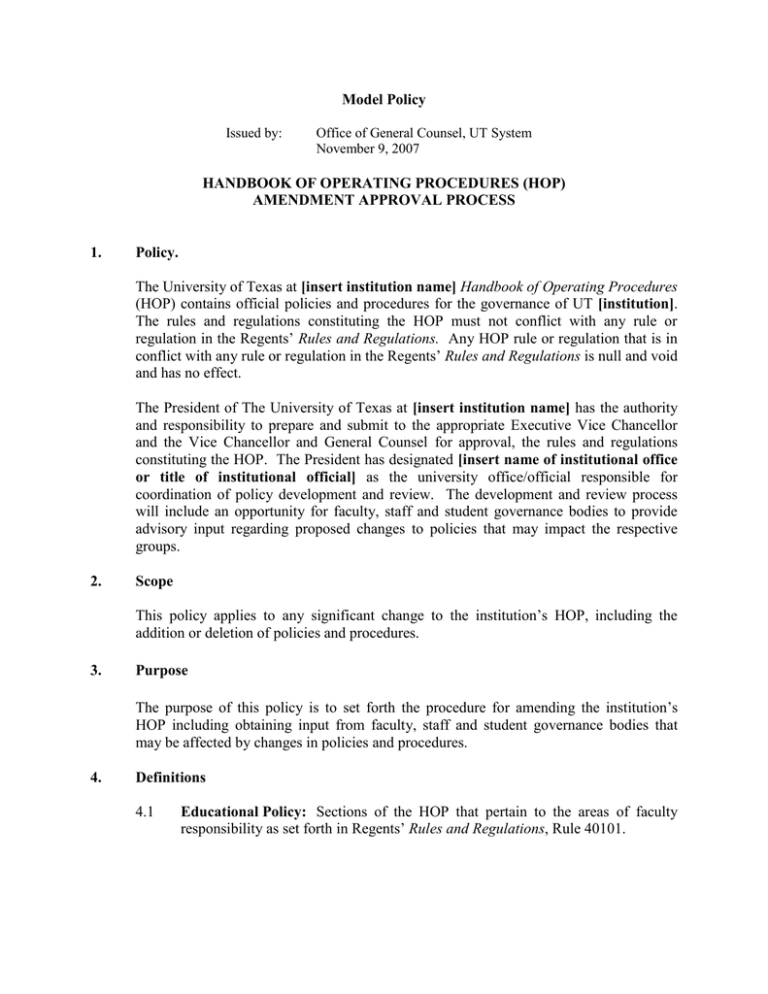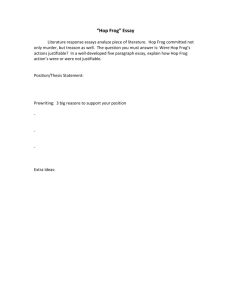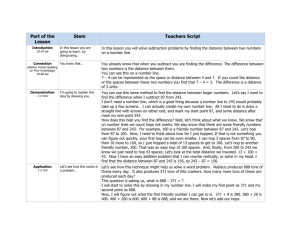Handbook of Operating Procedures (HOP) Amendment Approval Process
advertisement

Model Policy Issued by: Office of General Counsel, UT System November 9, 2007 HANDBOOK OF OPERATING PROCEDURES (HOP) AMENDMENT APPROVAL PROCESS 1. Policy. The University of Texas at [insert institution name] Handbook of Operating Procedures (HOP) contains official policies and procedures for the governance of UT [institution]. The rules and regulations constituting the HOP must not conflict with any rule or regulation in the Regents’ Rules and Regulations. Any HOP rule or regulation that is in conflict with any rule or regulation in the Regents’ Rules and Regulations is null and void and has no effect. The President of The University of Texas at [insert institution name] has the authority and responsibility to prepare and submit to the appropriate Executive Vice Chancellor and the Vice Chancellor and General Counsel for approval, the rules and regulations constituting the HOP. The President has designated [insert name of institutional office or title of institutional official] as the university office/official responsible for coordination of policy development and review. The development and review process will include an opportunity for faculty, staff and student governance bodies to provide advisory input regarding proposed changes to policies that may impact the respective groups. 2. Scope This policy applies to any significant change to the institution’s HOP, including the addition or deletion of policies and procedures. 3. Purpose The purpose of this policy is to set forth the procedure for amending the institution’s HOP including obtaining input from faculty, staff and student governance bodies that may be affected by changes in policies and procedures. 4. Definitions 4.1 Educational Policy: Sections of the HOP that pertain to the areas of faculty responsibility as set forth in Regents’ Rules and Regulations, Rule 40101. 4.2 5. Governance of the institution: Consists of the policies and procedures except medical procedures or protocols, affecting the way the institution directs, administers or controls the institution. This includes policies and procedures: (a) directing compliance with applicable state and federal laws and regulations, Regents’ Rules and Regulations, and UT System policies and policies with System-wide application; (b) addressing or affecting the responsibility and/or authority of the various offices and bodies that make up the institution; and (c) addressing the relationships between administration, faculty, students, and staff and institutional values and/or goals. 4.3 HOP Committee: The Committee appointed by the President to review and make recommendations regarding the HOP to the President. The HOP committee membership includes the President or his or her designee, the Vice Presidents or their respective designees, the Faculty Senate Chair, Staff Senate Chair, Student Government Association President the Policy Coordinator and other individuals as appointed by the President. 4.4 Policy Coordinator: Person or office appointed by the institution’s President to ensure institutional compliance with this policy. 4.5 Responsible Executive: The President, or his or her designee, or Vice President, or his or her designee, who is responsible for the programmatic, functional or administrative areas addressed by the policy and procedure. 4.6 Significant change: A change that results in a substantive change in the rule including changes to essential principle(s), scope or application of the HOP policy or procedure. Editorial changes, changes to reflect institutional organizational changes, paragraph and outline numbering, and reference citations are not significant changes. 4.7 Stakeholder Review Plan: A plan for obtaining advisory input from faculty, staff and student governance bodies that may be affected by changes in HOP policies and procedures. Procedure 5.1 Designations and Responsibilities. [The institutional policy must describe the institution’s process for: - designating Responsible Executives; - developing a periodic review schedule; 2 - designating a policy as pertaining to the areas of faculty responsibility in Educational Policy formulation; and developing a Stakeholder Review Plan.] EXAMPLE: The Policy Coordinator will chair the HOP Committee. The HOP Committee will review all HOP sections and for each section is responsible for designating a Responsible Executive; determining a periodic review schedule; designating whether it pertains to the areas of faculty responsibility in educational policy formulation; and developing a Stakeholder Review Plan. 5.2 HOP Review Process. [The institutional policy must describe the institution’s HOP review process which at a minimum must include: - the opportunity for stakeholders to provide advisory input; - a timeframe for stakeholders to provide input that takes into consideration the best interests of the institution regarding timely policy implementation including, but not limited to, legal or otherwise mandated deadlines for policy implementation; - regarding educational policy, a stakeholder review by the faculty governance body conducted in a reasonable time (60 days or less).] EXAMPLE: (a) Policies Not Related to Educational Matters (1) A university office proposing a new HOP section will draft the policy, in correct HOP format and prepare a statement of background and rationale for the new policy. (The Policy Coordinator will provide assistance upon request). A university office proposing a HOP amendment will prepare a draft in congressional style along with a statement of background and rationale for the amendment. The proposing office will route the documents through the appropriate dean, director, or administrative equivalent to the Responsible Executive. (2) The Responsible Executive will submit the proposal to the Policy Coordinator who will distribute it to the HOP Committee for review and approval. The HOP committee will confirm the Stakeholder Review Plan and develop a stakeholder review timeline that takes into consideration the best interests of the institution regarding timely implementation of the proposed HOP policy including, but not limited to, legal or otherwise mandated deadlines for policy implementation. 3 (b) (c) (3) The Policy Coordinator will distribute the proposed HOP policy in accordance with the Stakeholder Review Plan and timelines. (4) Advisory input from Stakeholders returned timely to the Policy Coordinator will be provided to the Responsible Executive for consideration. (5) The Responsible Executive will resubmit the proposed HOP policy with any incorporated changes to the HOP Committee. (6) Once a majority of the HOP committee has approved the proposed HOP policy, it will be submitted to the President for review and approval. Educational Policy (1) New or amended Educational Policy will be reviewed in accordance with Section 5.2(a)(1)-(6). (2) The Stakeholder Review Plan must include review by the faculty governance body. (3) The faculty governance review timeline will be reasonable (60 calendar days or less). HOP Policies with No Significant Changes Proposed changes to HOP sections that are not significant do not need to be approved in accordance with this policy or reviewed by the Executive Vice Chancellor or Vice Chancellor and General Counsel. The Policy Coordinator shall determine whether the change is significant. 5.3 Each policy in the HOP will be reviewed in accordance with the review schedule and timelines using the applicable process in Section 5.2. 5.4 After approval by the President, the Policy Coordinator will submit the proposed HOP policy to the appropriate UT System Executive Vice Chancellor and the Vice Chancellor and General Counsel for review and approval. The submission should include any changes shown in congressional style and a brief background and rational for the proposed policy. 5.5 The Policy Coordinator will notify the HOP Committee and Responsible Executive regarding the resolution of any comments received from UT System and make conforming changes as needed. Recommendations and comments from university attorneys are legal advice provided to university administration and are to be treated as privileged and confidential attorney-client communications. 4 5.6 6. The Policy Coordinator will notify the university community regarding approved HOP amendments by placing them in the HOP. Authority/Related Policies Regents’ Rules and Regulations, Rule 20201 Regents’ Rules and Regulations, Rule 10100 Regents’ Rules and Regulations, Rule 40101 5




